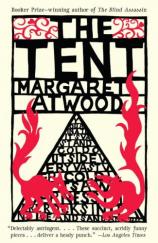The Tent
Review
The Tent
Never one to rest on her artistic laurels, Margaret Atwood, author
of THE BLIND ASSASSIN and THE HANDMAID'S TALE, has compiled a
clever sketchbook of images and ideas; short, imaginative prose
pieces, one long-form poem, all complemented by her own
illustrations. Poking fun at the archaic views of conventions such
as motherhood, science and love, Atwood turns these ideas on their
ear, as in her piece, "Chicken Little Goes Too Far," where the
well-known nervous character who proclaims that the sky is falling
gets a modern twist in this version. Here, he takes his
announcement to the media and forms an environmentally conscious
group, only to be assassinated by the head of a large development
company who builds retirement communities in the sky.
Atwood's feminist sensibilities shine through in the prose-like
poem "Bring Back Mom: An Invocation." An ungrateful child pines for
the way his/her old-fashioned mother used to be: a mom with shiny
red hair, always with a hearty meal at the ready --- a creation the
men of Stepford would have been proud of --- who ultimately gives
in to despair to become yet another victim of the suburban American
Dream:
"Mom, whose husband left her
For his secretary and paid alimony
Mom, who drank in solitude....
Who was carted away
and locked up, because one day
she began screaming and wouldn't stop."
"Salome Was a Dancer" harkens back to Atwood's earlier works, like
THE EDIBLE WOMAN, as she tells the story of a young girl who is
blessed with the looks and wiles to drive men wild. As a fellow
classmate, the narrator extols just how young Salome seduces the
Religious Studies teacher in order to get a better grade. When
their affair is brought to light, Salome claims she was attacked by
the young teacher. The teacher maintains that he was the one who
was taken advantage of, but of course the school sides with Salome
and her powerful father, and the young, impressionable teacher is
fired and later is seen panhandling in the subway.
In "Horatio's Version," Hamlet's dear friend and confidante sets
the record straight, not just on the atrocities at Elsinore, but
also on the violence that always has been pervasive in our society.
Through Atwood, Horatio functions as a sort of moral
watchdog:
"Somehow I no longer wanted to tell Hamlet's story. I wanted to
tell something a little more --- what's the term? Human, inhuman?
Something bigger. But statistics pall after a time. We're not
programmed to register more than a hundred corpses. In heaps they
simply become a landscape feature."
THE TENT displays the broad range of Atwood's many talents --- the
lyrical portrayal of even the most mundane or distasteful aspects
of life, the wonders of science and nature --- all with her
trademark wit and biting commentary, doled out here in this
collection as tiny, thought-provoking morsels in true Atwood
style.
Reviewed by Bronwyn Miller on January 23, 2011





